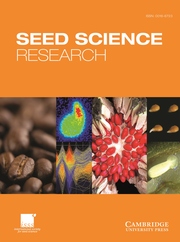Article contents
Exploring seed longevity of UK native trees: implications for ex situ conservation
Published online by Cambridge University Press: 21 July 2020
Abstract
UK trees require increased conservation efforts due to sparse and fragmented populations. Ex situ conservation, including seed banking, can be used to better manage these issues. We conducted accelerated ageing tests on seeds of 22 UK native woody species, in order to assess their likely longevity and optimize their conservation in a seed bank. Germination at four ageing time points was determined to construct survival curves, and it was concluded that multiple samples within a species showed comparable responses for most species tested, except for Fraxinus excelsior. Of all species studied, one could be classified as very short-lived, four as short-lived and 17 as medium, with none exceeding the medium category. The most important finding of this manuscript is that although some taxonomic trends were observed, the results indicate the need for caution when making broad conclusions on potential seed storage life at a species, genus or family level. Longevity predictions were compared to actual performance of older collections held in long-term storage at the Millennium Seed Bank, Kew. Although most collections remain high in viability in storage after more than 20 years, for short-lived species at least, there is some indication that accelerated ageing predicts longevity in seed bank conditions. For species with reduced potential longevity, such as Fagus sylvatica and Ulmus glabra, additional storage options are recommended for long-term gene banking.
- Type
- Research Paper
- Information
- Copyright
- Copyright © The Author(s), 2020. Published by Cambridge University Press
References
- 7
- Cited by



